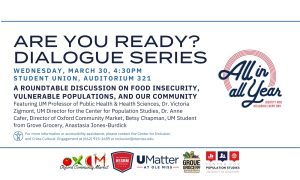Food insecurity has infiltrated nearly 15% of Mississippi’s population. The Center for Inclusion and Cross Cultural Engagement planned on hosting “Are You Ready? Dialogue Series: Food Insecurity” on March 30, but was canceled due to inclement weather.

Grove Grocery, Oxford Community Market, UMatter, Health Exercise Science and Recreation Management and Centers for Population Studies would have participated in a round table discussion centered around food insecurity and vulnerable populations in the community.
Panelists for the roundtable consisted of Victoria Zigmont, assistant professor of health, exercise science and recreation management, Anne Cafer, UM director for Center for Population Studies, Betsy Chapman, director of Oxford Community Market and Anastasia Jones-Burdick, Assistant Director of External Affairs.
Jones-Burdick said the panel would have addressed issues that students might not be ready to discuss, but need to in order to provoke change.
“The goal really is to educate on what food insecurity is, its prevalence on campus and ultimately what we can do as a student body and on this community youth community to improve the lives of people around us,” Jones-Burdick said.
Food insecurity is more than just hunger. A common misconception is that people who are food insecure do not have access to food, however panelists argued that food insecurity is not having access to healthy, nutritious food frequently.
Food insecurity affects one in four college students.
“Food insecurity can come in all different levels and all different forms, and that for students will definitely impede on their success if they’re having to stress out about what it’s like when they’re, well, where the next meal is going to come from, or when they can eat well-rounded full meal next,” Jones-Burdick said.
Grove Grocery aims to create comfort for college students through the food they provide at the pantry in Kinard hall.
“We want to make sure that they’re not feeling at a disadvantage with the foods that they eat, but use this as fuel to empower them,” Jones-Burdick said. “With Grove Grocery, we took a shift into more diversity, equity and inclusion efforts to look not only at making sure that the foods that we provide are nutritious, but that they can be medically tailored, that they’re culturally inclusive as well as their special dietary needs that students may have.”
Betsy Chapman, director of Oxford Community Market, said the market addresses food insecurity year round through several programs. One such program is the Supplemental Nutrition Assistance Program.
“Our SNAP program allows people to use their SNAP benefits at the market and then the market provides matching dollars so that people using SNAP at the market can have increased access to healthy, fresh local produce,” Chapman said. “We also participate in the Women, Infant and Children Nutrition Program (WIC) and senior Farmers Market Nutrition voucher program, which provides vouchers that people who receive WIC benefits or senior citizens can use to come and shop for fresh produce at the market. We also make deliveries of fresh produce every week, spring through like April through December to our local food pantry so that they have fresh produce that’s grown locally that they can distribute on Wednesday and Thursdays.”
The round table would have provided personal stories of members of the community who battle with food insecurity.
“For me, it’s a lot more personal than just hearing a statistic. To have an opportunity to connect with neighbors, hear their stories, hear how insecurity impacts in their everyday lives, and then hopefully, use opportunities like roundtable discussions to share some of the stories that we see in the course of our community neighborhood type of work is very powerful,” Chapman said.
Although the round table was canceled due to inclement weather, the panelists hope for the event to be rescheduled in the near future.



























